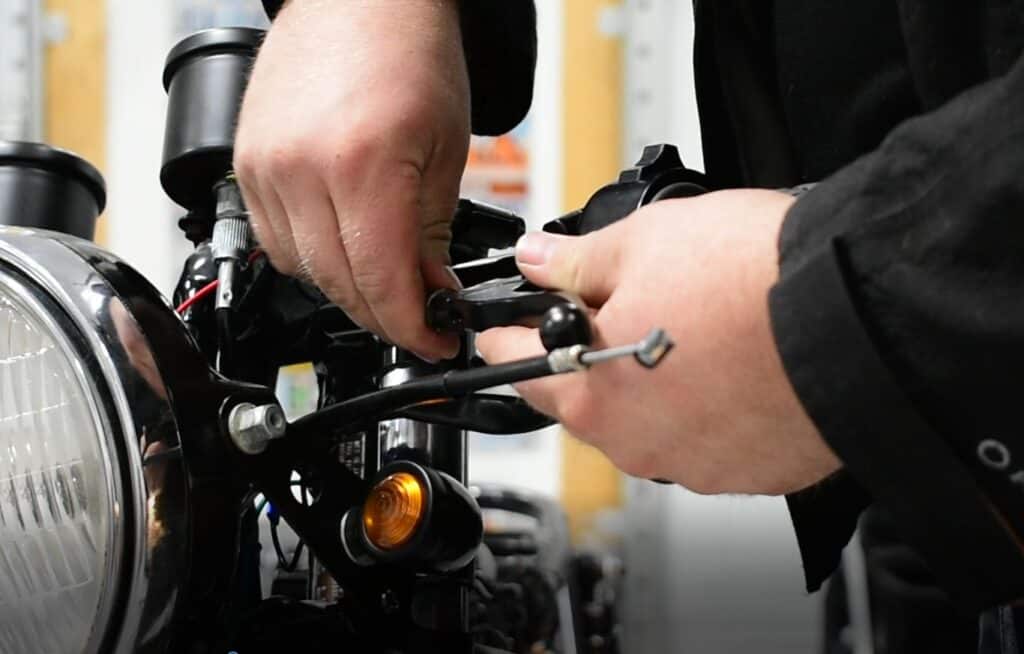
Riding a motorcycle is an involving process. It entails smooth control on the clutch, easy acceleration, steady braking, and smooth weight transfers around corners. All of these things can make motorcycle riding intimidating to a novice rider, but be assured, as confidence grows so does the love for the process.
But despite your experience and confidence, sometimes problems arise. A common problem among motorcycles is the difficulty in shifting.
So why is my motorcycle not shifting properly? A motorcycle will not shift properly if there is improper chain tension, low clutch fluid, too much slack on the clutch cable, and/or the clutch is worn-out. If one of any of these things are present, the rider’s ability to control a motorcycle’s inputs will diminish.
Having restored dozens of motorcycles in the last few years, I’ve had my fair share of clutch issues and fixes. In this article, we will look at the preventative maintenance behind these items, and learn a little bit more about how things outside the transmission of a motorcycle can prevent a motorcycle from shifting properly.
Reasons for Improper Shifting
Diagnosing a bike that hasn’t been shifting properly can be extremely intimidating, but it really shouldn’t be! Taking out and rebuilding a transmission is something that only a few trained professionals are capable of doing, but adjusting chain tension, monitoring and flushing fluid, and maintaining proper clutch cable adjustment is something that every hobbyist is capable of doing.
When diagnosing a motorcycle that is already improperly shifting, it is very important to note what symptoms are present. You need to ask yourself, is noise coming from any specific part of the bike? Does the clutch not disengage? Does the clutch not engage? Does the bike shudder at low/high rpm? How does the bike shift when it is up to operating temperature? What type of noise do you hear?
The most common fault that the rider will experience that will affect shifting will be the tension on a chain. This isn’t as pertinent to bikes that are shaft or belt driven, but it’s still a principle that’s important to understand.
When a motorcycle shifts gears, what is generally happening is the clutch is slowly released and engages a new gear ratio inside the transmission. After the next gear ratio is engaged, power is then sent out the front chain sprocket, causing the chain to rotate at a new speed and then transfer power out through the rear wheel. This is why chain maintenance is so important to a bike’s function and shifting ability. See our other article here that discusses more about how often you should get your motorcycle serviced.

A chain that is either too loose or too tight, will cause the bike to shudder or jerk as the rider shifts gears. Symptoms that are particular to this might be a slapping of the chain against the swing arm, or real jerky movements when rpms are lower than 3000.
To relate to a personal experience, I had a good friend who had an older Yamaha yzf-6r. He came to me one day telling me that his motorcycle wasn’t shifting right, and that it didn’t feel like it was running healthy. His first thought was that it was related to his carburetor, so I told him I’d take a look at it.
Before taking a look, I had him take some time to clean the chain, and then re-lubricate it, just so we could rule that out as a point of failure. It was no sooner after he cleaned his chain that he told me his bike was feeling healthy again! Keep good care of your chain, and stay up to date with the maintenance that’s manufacturer specific so you don’t run into a similar situation!
Another common failure item that could occur that will cause a motorcycle to not shift properly is old/low clutch fluid. Not all bikes have hydraulic clutch systems on them, so first you should check to see what kind of system you have on your motorcycle.
When the fluid on one of these systems is low, there are several things that you might begin to experience. First, the shifting won’t be very smooth. With low fluid or old fluid that has air in the system, your motorcycle clutch won’t be able to disengage fully before changing gears. This will cause the gears to collide, which will cause a grinding sound and should be avoided at all costs!
This gear clash inside the transmission will cause it to fail if it is not taken care of properly! Keeping track of the maintenance intervals of all fluids on a bike is critical to making it last, and looking at clutch fluid levels should be a part of normal weekend tune-ups on your bike.
It should be noted that if the fluid level on the clutch is low, it might mean that either your clutch is wearing down, or that there is a leak somewhere in the system. As you look at your fluid level, make sure that you are looking down the side of the bike to see if the fluid is leaking from anywhere noticeable. Sometimes all it takes is one new seal to fix the leak.

On motorcycles that don’t have a hydraulic clutch lever, they’re going to have a cable style clutch. The symptoms of an improperly adjusted clutch cable are identical to a bike that has low/old clutch fluid. Just like I mentioned above, an improperly adjusted cable can cause serious harm to a bike’s transmission, and proper adjustments should be maintained.
The biggest difference between the hydraulic style and the cable style is that the cable still needs to be adjust every so often, while the hydraulic requires no adjustment. Motorcycle specific adjustments can be found on forums/handbooks, but they key is to find where your clutch engages/disengages, and making sure that there isn’t too much free-play on either side of that.
Click here to see another article we have that discusses the symptoms of a bad motorcycle clutch.
Is Improper Shifting Bad for Your Motorcycle?
The quick answer to this is yes. Improper shifting, and/or shifting gears when the bike has a bad chain or low fluid, will cause excessive wear on components that are much more expensive and difficult to replace.
We shouldn’t be ripping our bike to redline every time we hop on it, or slamming from gear to gear without proper rev-matching if we want our bikes to last a long time. It’s also more important than we make sure we don’t over work any of the components before we give it a chance to warm up.
Slamming gears and accelerating hard while the engine, chain, transmission, and tires are still ‘cold’ can cause serious damage to our bike, and it can also be very dangerous. Proper motorcycle riding also involves making our riding conditions the best that we can so that we have the highest chance of riding for years to come.
Conclusion
Experiencing difficulties with shifting on a motorcycle can be frustrating and potentially dangerous if left unaddressed. Improper chain tension, low clutch fluid, too much slack on the clutch cable, and/or the clutch is worn-out are all common reasons why shifting issues may happen. This can be hard on your motorcycle, especially if it isn’t fixed quickly.
I’ve seen every problem a clutch could have since I’ve owned dozens of motorcycles that were old and needed work. These are the common problems I’ve run in to and have seen great success addressing them! Feel free to reach out with questions, I’m happy to answer them!

